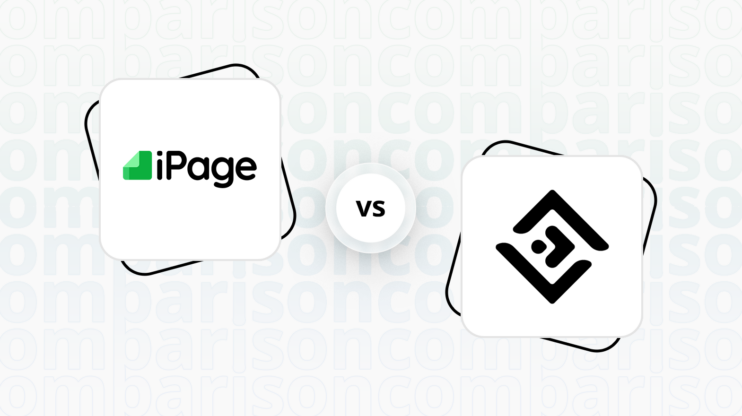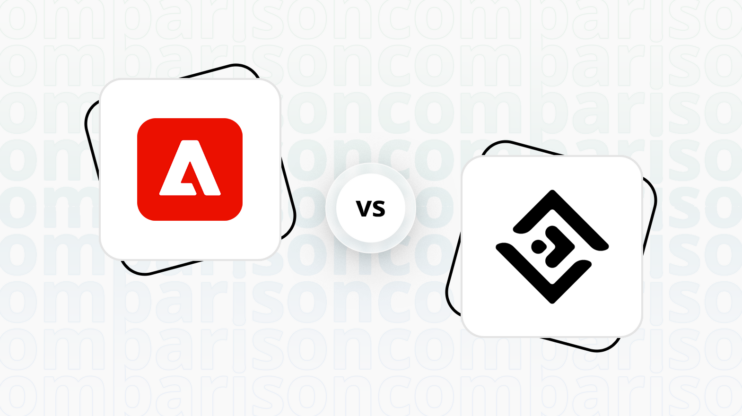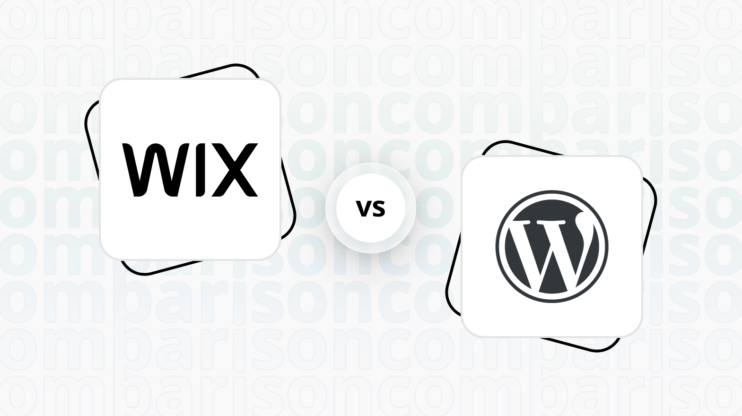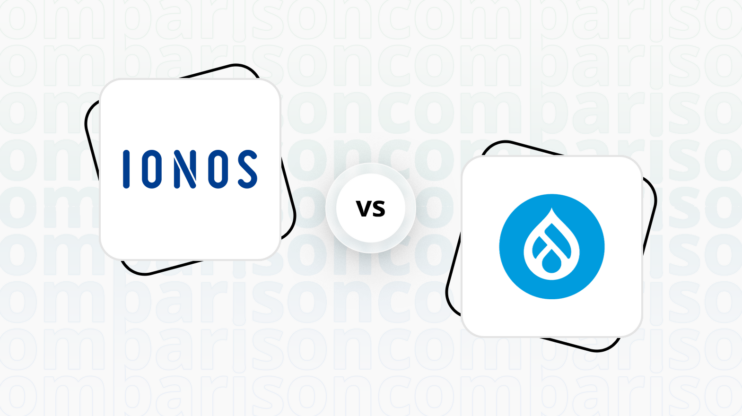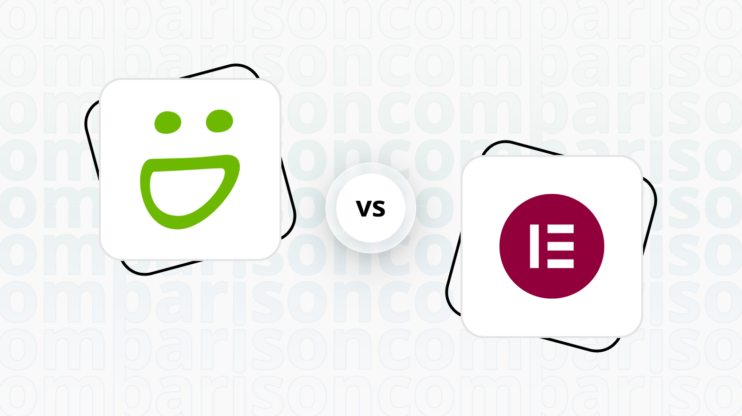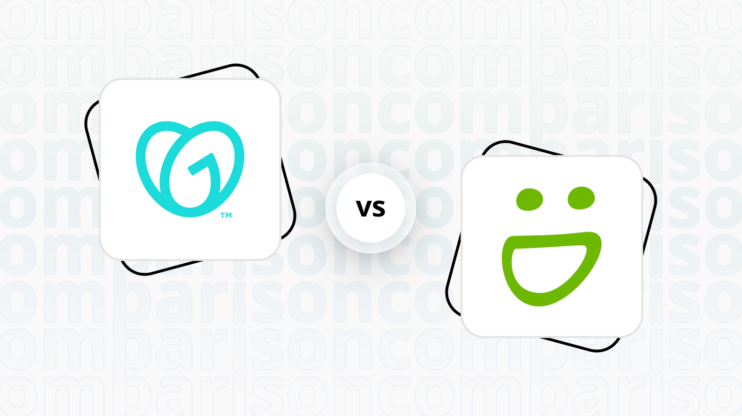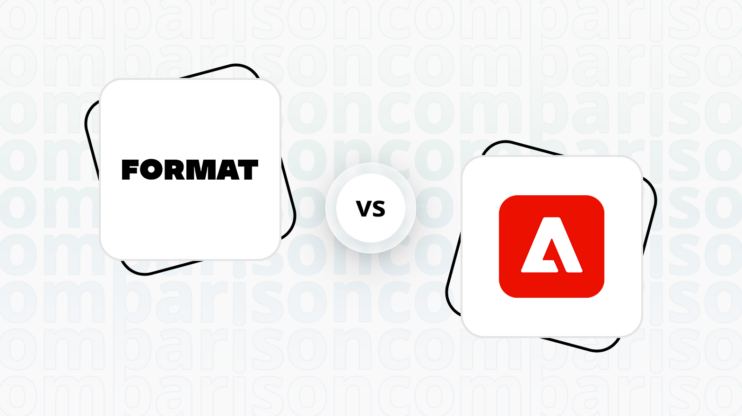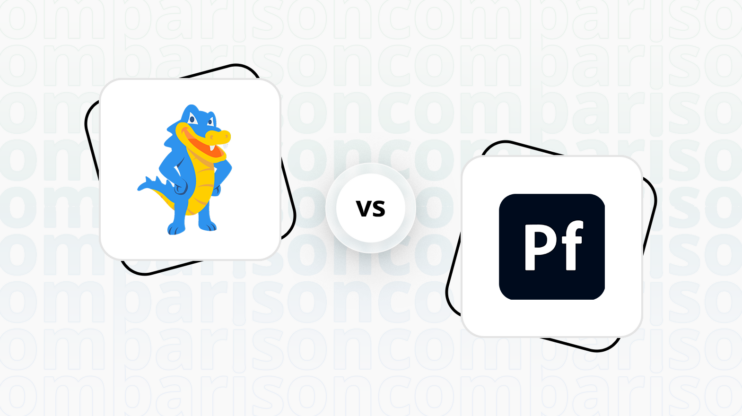Final verdict
iPage and Adobe Commerce (ex Magento) cater to different segments of the market, each with its unique strengths.
-
iPage (Overall Grade: 6.1/10)
is best suited for small businesses and personal projects, offering a user-friendly interface, affordable pricing, and a range of templates for easy website creation. Its partnership with Bluehost enhances its hosting capabilities, making it a solid choice for users seeking simplicity and cost-effectiveness. However, it may not scale well for larger enterprises or those with complex ecommerce needs. -
Adobe Commerce (ex Magento) (Overall Grade: 6.9/10),
on the other hand, is a robust platform designed for both B2B and B2C businesses looking for scalability, customization, and advanced ecommerce features. With its AI-driven personalization, cloud-native solutions, and extensive third-party integrations, Adobe Commerce is ideal for businesses aiming for growth and requiring a high degree of flexibility in their ecommerce operations.

|

|
|
|---|---|---|
|
Design functionalities & templates |
7.0 |
6.7 |
|
Ease of use |
7.6 |
5.4 |
|
Ecommerce |
5.7 |
9.4 |
|
Website Editors |
6.8 |
7.8 |
|
Product testing options |
2.5 |
3.9 |
|
Price |
7.3 |
5.8 |
|
Hosting quality |
7.7 |
8.1 |
|
Website speed optimization |
7.4 |
6.6 |
|
Plugins/extensions and integrations |
6.3 |
9.1 |
|
Marketing features |
7.2 |
8.1 |
|
Customer support |
6.9 |
8.3 |
|
Website security |
7.5 |
8.4 |
|
AI capabilities |
3.0 |
7.7 |
|
User management |
3.2 |
8.0 |
| Overall |
6.1 |
6.9 |
Best for ecommerce
 5.7
5.7
 9.4
9.4
Verdict
: For small businesses and personal projects, iPage offers a straightforward and user-friendly platform. However, Adobe Commerce (ex Magento) stands out as the superior choice for ecommerce, especially for businesses looking for scalability, advanced features, and customization.
-
iPage
: Targets small businesses and personal projects with its user-friendly interface and basic ecommerce features. It’s a good starting point for those new to online selling but may not support the growth of more demanding ecommerce operations. -
Adobe Commerce (ex Magento)
: Offers a robust platform with advanced ecommerce capabilities suitable for both B2B and B2C markets. Its scalability, customization options, and integration with Adobe Experience Cloud make it ideal for businesses aiming for growth and sophistication in their ecommerce endeavors.
Best for informational & business websites
 7.2
7.2
 7.4
7.4
Verdict
: Adobe Commerce (ex Magento) slightly edges out iPage for informational and business websites, offering a more robust and scalable platform, despite its higher complexity.
-
iPage
: iPage is user-friendly and offers a variety of templates, making it a good choice for small businesses and personal projects that require a straightforward informational website. Its partnership with Bluehost to improve hosting and pricing plans also makes it an attractive option for users looking for simplicity and affordability. -
Adobe Commerce (ex Magento)
: Adobe Commerce provides a versatile and scalable solution that, while more complex, offers advanced features like AI-driven personalization and integration with Adobe Experience Cloud. Its focus on flexibility, scalability, and security makes it better suited for informational and business websites that anticipate growth and require a high degree of customization.
Detailed comparison
Design functionalities & templates
Design FunctionalitiesRepresents how well each platform allows for creative design and customization of websites.Score Components:
- Template Variety (30%): Range and quality of design templates.
- Customization (30%): Flexibility and options for design alterations.
- User Interface (20%): Ease and intuitiveness of the design process.
- Responsiveness (10%): Adaptability to different devices and screen sizes.
- Innovation (10%): Unique design features and tools.
 7.0
7.0
 6.7
6.7
🏆
Winner: iPage.
iPage offers a wider variety of templates and designs, and it’s more user-friendly, making it a better choice for those without technical expertise.
iPage offers a wide variety of templates and designs, catering to users with diverse needs and preferences. With hundreds of options available, ranging from simple and elegant to complex and dynamic, users can easily find a template that suits their specific project or business requirements. These templates are also customizable, allowing for a high degree of personalization in terms of layout, color schemes, and functionality.

On the other hand, Adobe Commerce, formerly Magento, prioritizes flexibility over pre-built templates. While it offers a limited selection of base themes, users can access third-party themes for customization. Theme options are highly adaptable, allowing changes to layouts, colors, fonts, and the creation of custom page layouts. The platform provides a powerful theme framework for comprehensive control, including frontend editing for basic adjustments. Experienced developers can employ custom code (HTML, CSS, Javascript) for unique designs and advanced functionalities.
Adobe Commerce(ex Magento) Themes
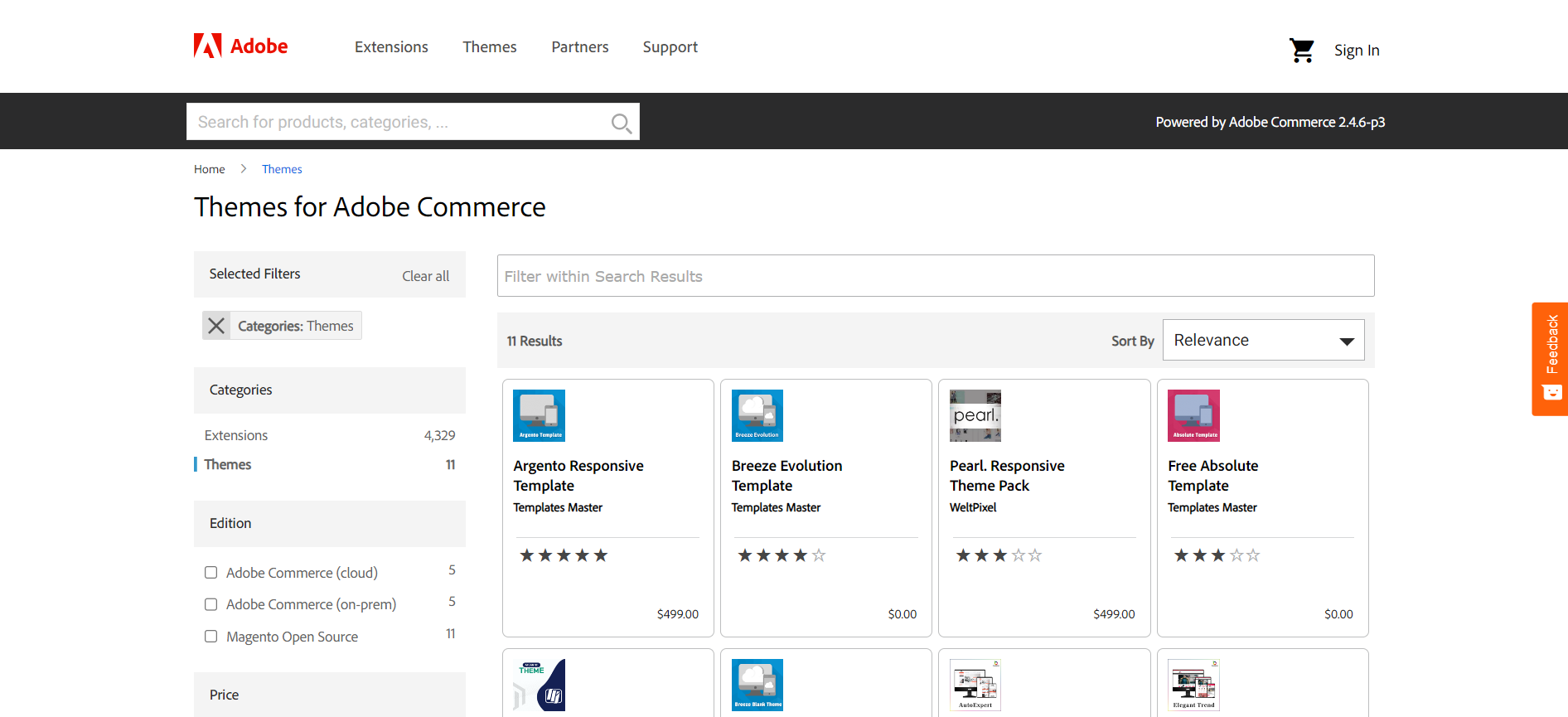
Get a head start on website creation with AI
Create a custom website tailored to your business needs 10X faster with 10Web AI Website Builder!
Ease of use
Ease of useReflects the platform’s overall user-friendliness.Score
Components:
- Learning curve (40%): Quickness and ease of getting started.
- Interface design (30%): Simplicity and intuitiveness of layout.
- User guidance (20%): Quality of tutorials and support.
- Flexibility (10%): Adaptability to various user skills.
 7.6
7.6
 5.4
5.4
🏆 Winner: iPage
. Scoring 7.6, iPage is designed with simplicity in mind, making it highly accessible for users with no prior web development experience. On the other hand, Adobe Commerce(ex Magento), with a score of 5.4, is more complex and requires technical expertise, making it less user-friendly for beginners.
Learning Resources
🏆 Winner: Adobe Commerce(ex Magento)
. Both platforms offer comprehensive learning resources, but Adobe Commerce(ex Magento) provides a wider range of materials, including videos, tutorials, and instructor-led courses, catering to various user roles and proficiency levels.
For ecommerce
EcommerceMeasures the platform’s effectiveness in supporting online business activities.Score Components:
- Ecommerce themes and templates (20%): Variety and design of templates.
- Product management (25%): Ease of managing and organizing products.
- Payment options (25%): Variety and convenience of payment methods.
- Ecommerce features (20%): Features for managing an ecommerce store.
- Integration (10%): Compatibility with external e-commerce tools and services.
 5.7
5.7
 9.4
9.4
Adobe Commerce (ex Magento) is a robust ecommerce platform with a high score of 9.4, suitable for both B2B and B2C businesses. It offers AI-driven personalization, supports multiple brands and markets, and ensures scalability with cloud-native solutions. On the other hand, iPage, with a score of 5.7, is a user-friendly platform that offers a range of ecommerce features suitable for small to medium-sized businesses. However, it might not scale well for very large enterprises or those with highly complex ecommerce needs.

|

|
|
|---|---|---|
|
Ecommerce themes and templates |
5.5 |
7.5 |
|
Product page customization |
5.0 |
9.0 |
|
Payment processing and commissions |
6.0 |
7.8 |
|
POS capabilities |
3.0 |
7.0 |
|
Payment gateways |
6.5 |
8.5 |
|
Product numbers |
4.0 |
7.5 |
|
Additional ecommerce features |
5.5 |
8.0 |
iPage ecommerce features:
- Inventory Management and Tracking
- Coupon Codes and Promotions
- SEO Tools
- PayPal Integration
Adobe Commerce (ex Magento) ecommerce features:
- Product and Inventory Management
- Order Management
- Customer Management
- Marketing and Promotions
- Payment Processing
- Multi-Channel Commerce
Ecommerce themes & templates
iPage offers a variety of ecommerce-specific templates designed to cater to online stores and businesses. These templates are integrated with features such as shopping carts, product catalogs, and payment processing options to facilitate online transactions. However, users might find some limitations in terms of customization and advanced ecommerce functionalities compared to specialized ecommerce platforms.
Adobe Commerce, powered by Magento, offers a comprehensive ecosystem for ecommerce themes and templates, enabling businesses to customize their online stores to meet specific branding and functionality requirements. Themes in Adobe Commerce serve as the visual and structural framework for online stores, incorporating layout files, template files, translation files, and skins to define the look and feel.
Product page customization
iPage’s website builder offers a range of ecommerce product page customization options, allowing users to design their storefronts with various templates, adjust layouts, and incorporate multimedia elements like images and videos to showcase products. However, limitations may include less flexibility in advanced customization or coding for those who require unique, highly tailored functionalities beyond the provided templates and settings.
Adobe Commerce offers extensive customization options for product pages, enabling businesses to enhance the user experience and tailor product displays to their specific needs. This includes customizing layouts, product attributes, images and media, dynamic content like related products and reviews, and custom product options such as configurable and bundled products.
Payment processing
iPage supports several payment options for eCommerce, including major gateways like PayPal, Stripe, and others, catering to a wide range of currencies and countries. iPage does not charge commissions for transactions, commissions are charged by the gateways themselves. While iPage offers flexibility in online payment processing, it does not explicitly mention integrated POS capabilities for in-person transactions.
Adobe Commerce offers integrated payment solutions and commission management for seamless online transactions, alongside POS integration for omnichannel retail experiences. It supports a wide array of payment gateways, ensuring flexible and secure payment options for customers. These features make Adobe Commerce a versatile platform for businesses aiming to provide a comprehensive and secure shopping experience both online and in physical stores.
Website Editors
Website EditorsEvaluates the platforms’ website building and editing capabilities.Score Components:
- Customization tools (40%): Range and power of editing features.
- Editor usability (30%): User experience within the editor.
- Design flexibility (20%): Freedom in layout and design changes.
- Update and maintenance ease (10%): Simplicity of updating and maintaining the site.
 6.8
6.8
 7.8
7.8
🏆
Winner: Adobe Commerce(ex Magento)
. Adobe Commerce(ex Magento), with a score of 7.8, offers a robust ecommerce platform designed for flexibility and scalability, enabling businesses to create customized online stores with extensive features for product management, customer engagement, and analytics. It supports both B2B and B2C models and offers a range of tools for marketing, SEO, and inventory management, along with a vast ecosystem of extensions. Suitable for businesses of all sizes, Adobe Commerce provides options for cloud-hosting or self-hosting, catering to a wide array of ecommerce needs.
iPage’s editor, scoring 6.8, is designed for ease of use, catering to both beginners and those with some web design experience. It offers a drag-and-drop interface, allowing users to easily add, remove, and customize elements on their web pages without needing to code. Users can choose from a variety of templates that are responsive and customizable to fit their brand or personal style. Additionally, the editor includes features for adding social media links, integrating e-commerce functionalities, and optimizing for search engines, making it a versatile tool for creating a wide range of websites.
Mobile editor/app
 5.0
5.0
 0
0
🏆
Winner: iPage
. Neither iPage nor Adobe Commerce (ex Magento) offer a dedicated mobile app for website editing. However, iPage allows users to edit their websites on a mobile browser, albeit with some limitations. This gives iPage a slight edge over Adobe Commerce, which does not provide any mobile editing capabilities at this time.
Product testing options
Product Testing OptionsAssesses the options for trying out platform features before commitment.Score Components:
- Trial quality (40%): Extent and usefulness of the trial or free version.
- Feature accessibility (30%): How many features are available to test.
- Trial duration (20%): Length of the trial period.
- Ease of transition (10%): Smoothness of moving from trial to paid plans.
 2.5
2.5
 3.9
3.9
Overall Result
:
Adobe Commerce(ex Magento) wins
. Adobe Commerce(ex Magento) scores 3.9, while iPage scores 2.5. Adobe Commerce(ex Magento) offers the possibility to test premium features by requesting a demo version for a trial period. iPage, on the other hand, allows testing of all features during the 30-day refundable period. However, iPage does not offer a free trial, and Adobe Commerce(ex Magento) does not have a money-back guarantee.

|

|
|
|---|---|---|
|
Free Plan |
No | No |
|
Trial Duration |
No free trial |
Demo version upon request |
|
Testing Premium Features |
During 30-day refundable period |
Demo version for trial period |
|
Money Back Guarantee |
30-day money back guarantee |
No money back guarantee |
Price
PriceLooks at the cost-effectiveness and value for money of each platform.Score Components:
- Plan value (40%): What each pricing tier offers.
- Transparency and clarity (30%): Clearness of pricing structures.
- Flexibility of plans (20%): Range of options to suit different budgets.
- Hidden costs (10%): Additional expenses not included in the plan.
 7.3
7.3
 5.8
5.8
iPage offers a range of pricing plans starting from $15.99 per month, with up to 80% discount for annual subscriptions depending on the plan. Adobe Commerce(ex Magento), on the other hand, starts from approximately $2,000 and is tailored to a wide range of business demands.

|

|
|
|---|---|---|
|
$10-$20 |
Basic ($15.99/month): Simple website or blog, 1 website, 10 GB SSD, free domain, managed WordPress, free SSL for 1st year. Value for price: 6.5 |
No offering at this amount. |
|
$20-$30 |
Choice Plus ($27.99/month): Multiple sites with storage, security, backups, 3 websites, 40 GB SSD, daily backups, domain privacy, malware scanning. Value for price: 7.5 |
No offering at this amount. |
|
$30-$34 |
Online Store ($32.99/month): Online selling with eCommerce tools, 3 websites, 40 GB SSD, store features like unlimited products and secure payments. Value for price: 8.0 |
No offering at this amount. |
|
$34-$40 |
Pro ($34.99/month): High traffic sites, advanced storage, 5 websites, 100 GB SSD, optimized for high traffic, enhanced security and backups. Value for price: 9.0 |
No offering at this amount. |
|
$2000+ |
No offering at this amount. |
Adobe Commerce Pro and Managed Services ($2000/month): Adobe Commerce Pro and Managed Services are designed to deliver scalable, secure, and extensive eCommerce solutions tailored to a wide range of business demands. It offers a comprehensive set of ecommerce tools, including product and inventory management, efficient order processing, customer account management, targeted marketing capabilities, diverse payment processing options, robust security measures, and scalability to accommodate business growth. It also offers both self-hosted and cloud-hosted options, providing flexibility and optimized performance. While it does not have an AI website builder, it offers a powerful theme framework for comprehensive control, including frontend editing for basic adjustments. Experienced developers can employ custom code for unique designs and advanced functionalities. |
location. As a result in rare cases the prices displayed here can differ from the ones you see on their
websites.
Hosting quality
Hosting
qualityExamines the reliability and performance of the hosting solutions.Score Components:
- Uptime (40%): Consistency and reliability of website availability.
- Speed (30%): Loading times and performance.
- Bandwidth and storage (20%): Sufficiency of resources provided.
- Data centers (10%): Quality and distribution of hosting infrastructure.
 7.7
7.7
 8.1
8.1
Winner: Adobe Commerce(ex Magento)
Adobe Commerce(ex Magento) offers robust and scalable eCommerce solutions with both self-hosted and cloud-hosted options, providing flexibility and optimized performance. iPage, on the other hand, offers a range of affordable hosting services including shared, WordPress, and VPS hosting, with unlimited storage and bandwidth for various website needs. However, its performance speed and scalability features may not meet the expectations of all users, particularly those with high-traffic sites.

|

|
|
|---|---|---|
|
Do they offer hosting? |
Yes |
Yes |
|
Data Centers: |
2 data centers: US, Europe |
Adobe Commerce on Cloud infrastructure Leverages Amazon Web Services (AWS), Specific data center details not publicly available |
|
Type of hosting: |
Managed WordPress Hosting |
Self Hosting, Managed Hosting |
|
Uptime: |
99.9% |
Uptime Guarantee for Adobe Managed hosting is provided |
|
Uptime Guarantee: |
No |
Yes |
Website Speed Optimization
Website Speed OptimizationEvaluates optimization of website loading timesScore Components:
- PageSpeed Score (30%): Google’s score indicating performance optimization.
- Loading Time (30%): The average time until a website is fully interactive.
- Mobile Optimization (15%): Optimization effectiveness for mobile devices.
- Resource Optimization (15%): Optimizing images, scripts, and other heavy resources.
- CDN Usage (10%): Use of CDN to enhance speed across geolocations.
 7.4
7.4
 6.6
6.6
🏆 Winner: iPage
Both iPage and Adobe Commerce(ex Magento) prioritize website performance and page speed, with iPage focusing on web server optimizations, caching, CDN, database optimization, and SEO optimization, and Adobe Commerce(ex Magento) emphasizing CDN, database optimization, caching, and indexing. However, iPage gets a slight edge when it comes to website speed optimization.

|

|
|
|---|---|---|
|
Focus |
Web Server optimizations, Caching, CDN, Database optimization, SEO optimization |
CDN, Database optimization, Caching, Indexing |
|
Performance Tools |
Google Lighthouse, PageSpeed Insights |
Google PageSpeed Insights Integration |
|
Key Strategies |
Web Server optimizations, Caching, CDN, Database optimization, SEO optimization |
CDN, Database optimization, Caching, Indexing |
|
Load Times |
2.6s average |
Varies widely, dependent on optimization |
|
Page Speed Scores Range |
72/100 average |
Scores vary; influenced by plugins, images |
|
Core Web Vitals Improvement |
LCP, FID, CLS improvements |
Emphasis on LCP, FID, CLS improvements |
iPage, a user-friendly web hosting and site builder platform, offers a range of strategies for speed optimization including web server optimizations, caching, CDN, database optimization, and SEO optimization. It has an average load time of 2.6 seconds and an average PageSpeed score of 72/100. iPage also focuses on improving Core Web Vitals, specifically LCP, FID, and CLS.
On the other hand, Adobe Commerce(ex Magento), a versatile commerce platform, also prioritizes website performance and page speed. Its strategies for speed optimization include CDN, database optimization, caching, and indexing. However, its load times and PageSpeed scores vary widely, depending on optimization, and are influenced by plugins and images. Like iPage, Adobe Commerce(ex Magento) also emphasizes on improving Core Web Vitals, specifically LCP, FID, and CLS.
Get a head start on website creation with AI
Create a custom website tailored to your business needs 10X faster with 10Web AI Website Builder!
Plugins and integrations
Plugins and integrationsMeasures the range and effectiveness of additional plugins and integrations.Score Components:
- Variety of options (40%): Range of available add-ons.
- Integration smoothness (30%): Ease of integrating plugins into the site.
- Quality of plugins (20%): Functionality and reliability of the options.
- Custom integration capabilities (10%): Support for custom or third-party integrations.
 6.3
6.3
 9.1
9.1
🏆 Winner: Adobe Commerce(ex Magento).
Adobe Commerce(ex Magento) scores a high 9.1, offering a vast array of extensions and plugins, estimated to be in the tens of thousands, covering aspects such as marketing, payment processing, shipping, content management, security, and optimization. iPage, with a score of 6.3, offers a variety of plugins and extensions, with options ranging from SEO tools to security enhancements. However, the sheer volume and diversity of Adobe Commerce’s offerings give it a clear edge in this category.
Adobe Commerce(ex Magento) Applications
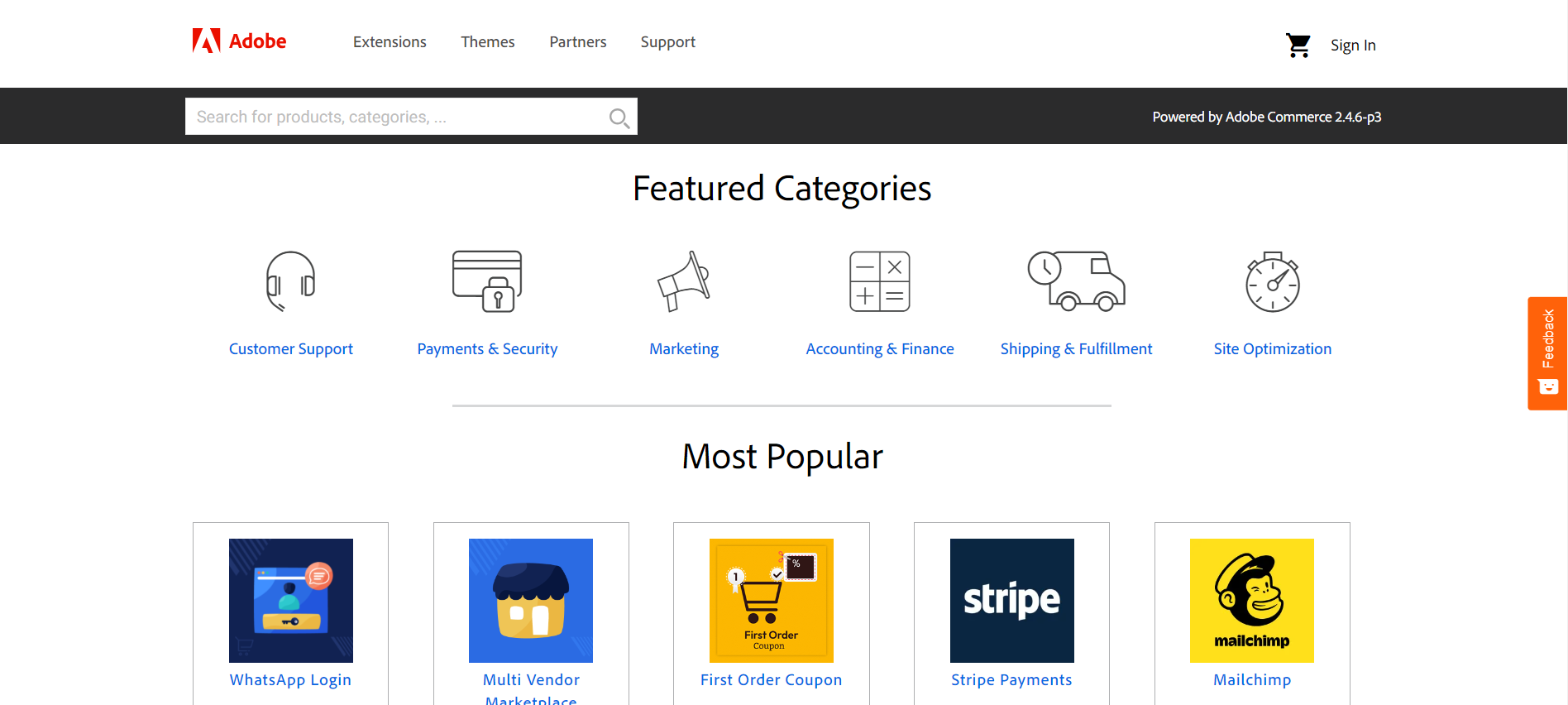
Marketing Features
Marketing featuresAssesses tools and options available for marketing.Score Components:
- SEO tools (40%): Effectiveness of SEO features.
- Marketing automation (30%): Availability and quality of marketing tools.
- Social Media integration (20%): Ease and depth of social media connectivity.
- Email marketing (10%): Quality and usability of email marketing tools.
 7.2
7.2
 8.1
8.1
🏆
Overall Winner: Adobe Commerce(ex Magento)
. Adobe Commerce(ex Magento) offers more advanced marketing tools, especially in analytics, reporting, and ad campaign management. iPage is strong in SEO and email marketing, ideal for small businesses and personal projects.

|

|
|
|---|---|---|
|
SEO Tools |
|
|
|
Email Marketing |
|
|
|
Blogging |
|
Can be integrated with platforms like WordPress |
|
Social Media Integration |
Integrated social media buttons and features |
|
|
Analytics and Reporting |
Option to integrate Google Analytics |
Detailed insights into ecommerce activities |
|
Ads and Promotions |
Offers SEO, social media integration, email marketing |
Advanced tools for creating and managing promotions |
Customer Support
Customer supportEvaluates the quality and availability of support options.Score Components:
- Response time (40%): Speed of support responses.
- Support quality (30%): Effectiveness and helpfulness of the support.
- Availability (20%): Range of support channels (phone, chat, email).
- Resource richness (10%): Quality of self-help and educational materials.
 6.9
6.9
 8.3
8.3
🏆 Winner: Adobe Commerce(ex Magento)
. Adobe Commerce(ex Magento) outperforms iPage in this category with a customer support score of 8.3 compared to iPage’s 6.9. Adobe Commerce(ex Magento) offers 24/7 customer support through various channels such as phone, email, and live chat. They also provide a comprehensive knowledge base and community forums for self-help and troubleshooting. In addition, Adobe Commerce(ex Magento) provides enterprise-level customer support, offering 24/7 technical assistance, dedicated account management, and access to a global network of experts.
On the other hand, iPage also provides 24/7 customer support through phone, email, and live chat. However, they do not provide enterprise support as they don’t have an enterprise plan.
Security
SecurityLooks at the platforms’ security measures and data protection.Score Components:
- Data protection (40%): Safeguards for user and customer data.
- SSL and encryption (30%): Implementation of secure connections.
- Compliance (20%): Adherence to industry security standards.
- Regular updates (10%): Frequency of security updates and patches.
 7.5
7.5
 8.4
8.4
🏆
Winner: Adobe Commerce(ex Magento)
. Adobe Commerce, formerly known as Magento, provides a secure environment for both B2B and B2C businesses. It offers advanced encryption and access control measures to protect sensitive customer data and payment details. Regular security updates and patches, secure payment processing, and tools for monitoring suspicious activity further enhance the security of websites built with Adobe Commerce.
iPage, on the other hand, also offers several security measures to protect websites hosted on its platform. It provides services like Domain Privacy Protection and SiteLock, a comprehensive security suite designed to protect websites from malware, spam, and hackers. However, Adobe Commerce’s higher security score and more robust security features give it the edge in this comparison.
AI Capabilities
AI capabilitiesMeasures the effectiveness of AI-driven features and tools.Score Components:
- Automation efficiency (40%): Impact of AI on streamlining processes.
- Personalization (30%): AI-driven customization for users or customers.
- AI-Assisted design (20%): Role of AI in website design and functionality.
- Data analysis (10%): Use of AI in interpreting user data and analytics.
 3.0
3.0
 7.7
7.7

|

|
|
|---|---|---|
|
Personalized Design |
iPage offers an AI-powered website builder |
|
|
SEO Optimization |
|
AI-driven SEO optimization tools |
|
Customer Behavior Analysis |
|
AI-powered customer behavior analysis |
|
Sales Predictions |
|
AI-powered sales forecasting tools |
|
Inventory Management |
|
AI tools for efficient inventory management |
|
Content Generation |
|
AI assistance in creating and optimizing site content |
🏆 Winner: Adobe Commerce (ex Magento)
. Adobe Commerce’s AI capabilities are more comprehensive and sophisticated, particularly in the areas of SEO optimization, customer behavior analysis, sales predictions, inventory management, and content generation.
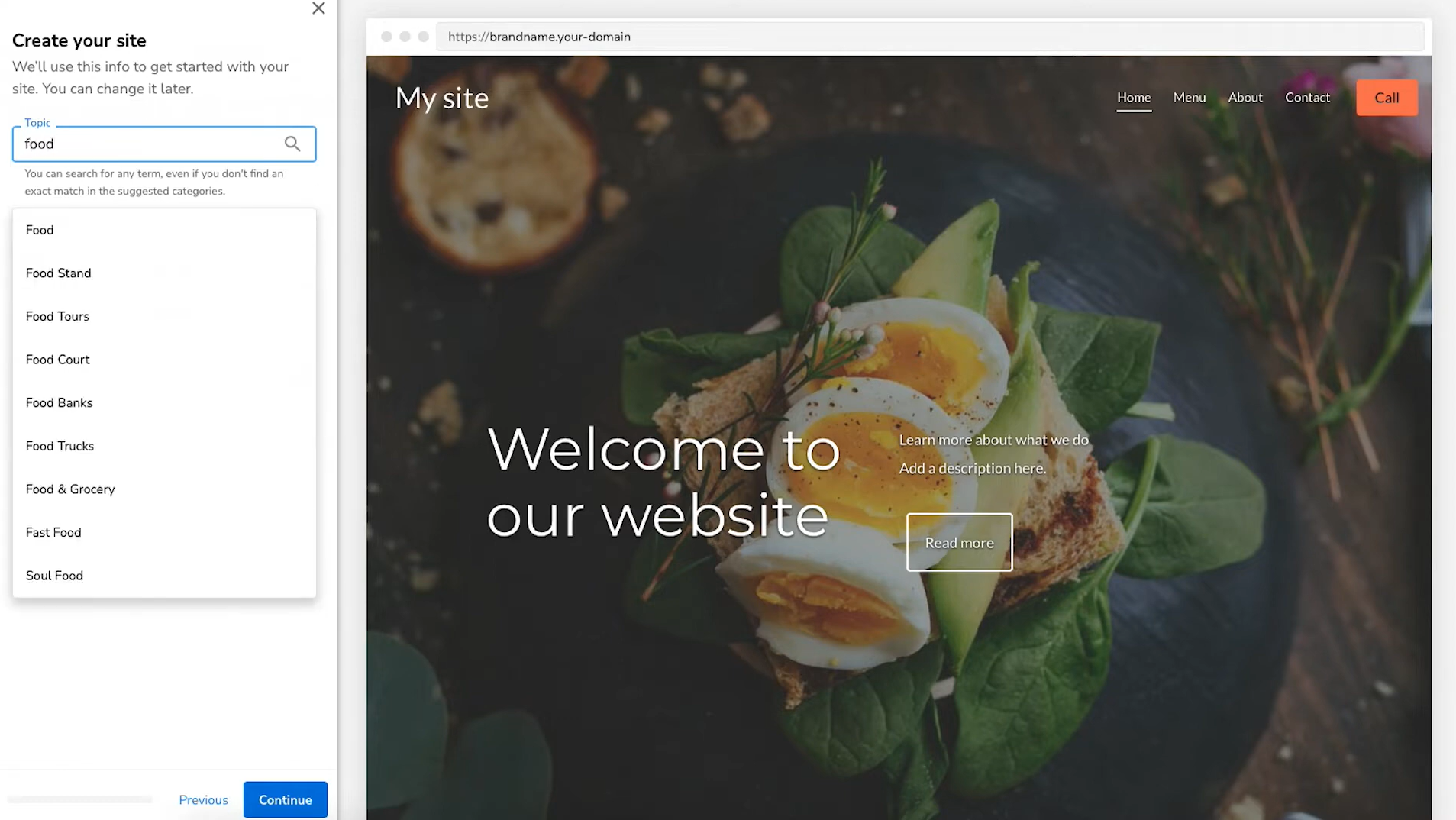
iPage, with a score of 3.0, offers an AI-powered website builder, but lacks advanced AI content generation or sophisticated AI-driven design tools.
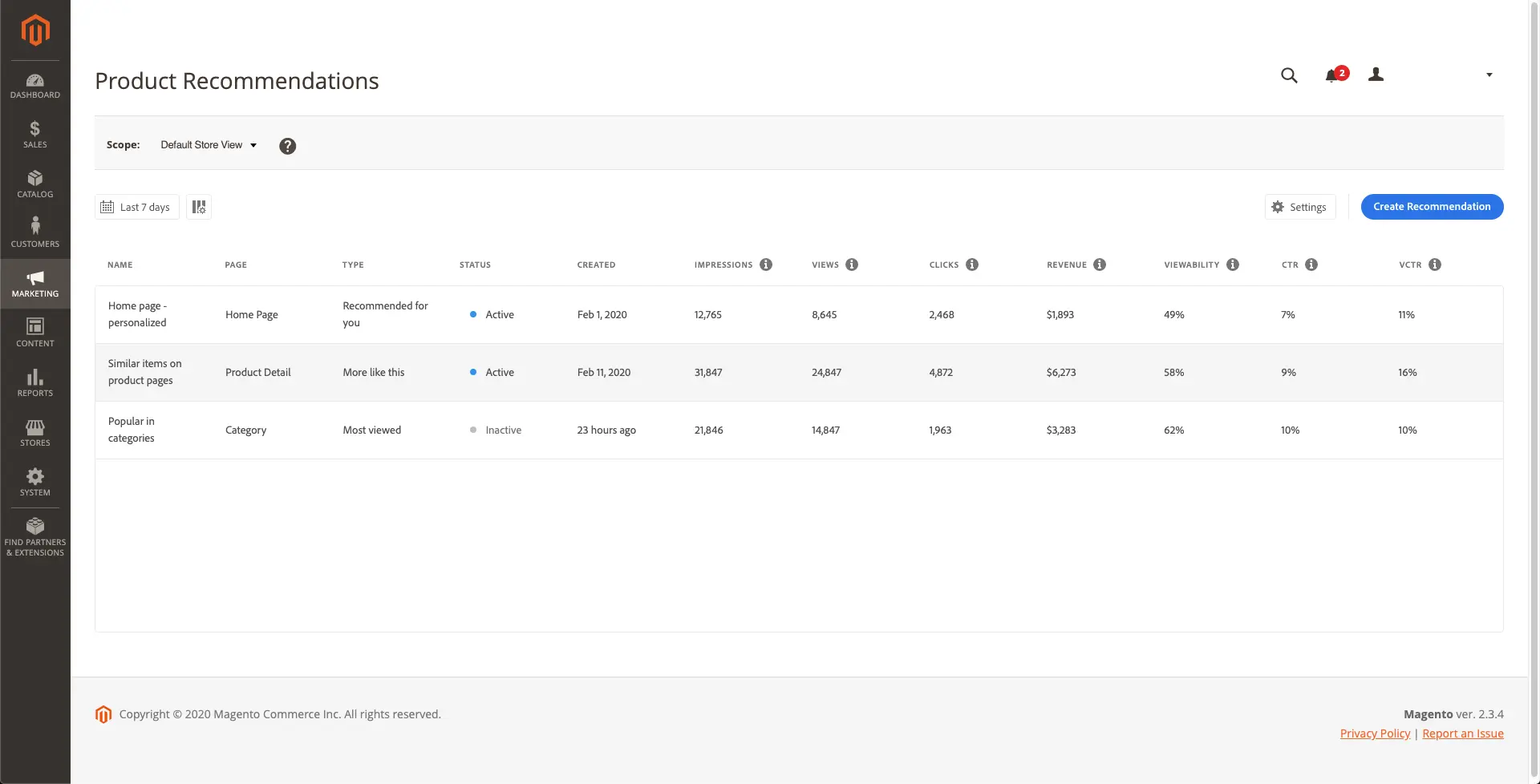
User Management
User ManagementAssesses the platforms’ capabilities in managing user roles, permissions, and accessibility.Score Components:
- Role Customization (40%): Flexibility in creating and defining user roles and
permissions. - Ease of Management (30%): User interface and tools for managing users.
- Access Control (20%): Effectiveness of access control measures for different user
levels. - Scalability (10%): Ability to manage a growing number of users efficiently.
 3.2
3.2
 8.0
8.0
🏆 Winner: Adobe Commerce(ex Magento)
. Adobe Commerce (ex Magento) offers a more sophisticated user management system compared to iPage.
- iPage’s website builder offers very limited multi-user functionality and access levels compared to more sophisticated website builder platforms.
- The number of users who can edit an Adobe Commerce website depends on user licenses and roles. User licenses, bought separately, determine the total number of users allowed, with additional licenses purchasable as needed. Roles and permissions, managed within the available licenses, control access and modifications, ensuring data security and efficient workflow.
Adobe Commerce(ex Magento) User Roles and Access Levels:
| Role | Description | Access Highlights |
|---|---|---|
| Administrator | Has full permissions to all aspects of Adobe Commerce, including global settings and data. | Full access to all settings, data, and functionalities within Adobe Commerce. Can manage other users’ roles and permissions. |
| Store Administrator | Responsible for the day-to-day management of the store, including products, orders, and customer service. | Access to manage products, process orders, and handle customer inquiries, but may have restricted access to sensitive global settings or data. |
| Design Team Member | Focuses on the aesthetic and user experience aspects of the store, working on content design and layout. | Access to content design tools and functionalities, but restricted from accessing customer, order information, and other sensitive areas. |
| Default User (B2B) | Has view-only access to company profile and credit information, and full access to activities related to sales and quotes. | Full access to sales and quotes activities; view-only for company profile and credit information. |
| Senior Buyer (B2B) | Engaged in purchasing, with access to all Sales and Quotes resources, and view-only permissions to the Company Profile, User and Teams, Payment Information, and Company Credit. | Comprehensive access to Sales and Quotes, with limited viewing rights for company’s financial and profile data. |
| Assistant Buyer (B2B) | Assists in purchasing activities, with permissions to place orders using Checkout with Quote, and to view orders, quotes, and company profile information. | Permission to execute orders and access relevant purchasing data; view-only access to company profile information. |
Additional Features

|

|
|
|---|---|---|
|
SSL Certificate |
|
|
|
Custom Domain |
|
|
|
Free Custom Domain Included |
|
|
|
International Domains |
|
|
|
Mobile Responsive |
|
|
|
Page Speed |
|
|
|
Website Builder Mobile App |
|
|
|
Convert a Website To An App |
|
|
|
Website Analytics |
|
|
|
Multilingual Sites |
|
|
|
Multiple Users |
|
|
User Feedback
Unfortunately, there is no user feedback available for iPage as it is not listed on the G2 platform.
On the other hand, Adobe Commerce (formerly Magento Commerce) receives high praise for its comprehensive ecommerce solutions, offering features like customer and order management, scalability, and customization options. Users appreciate its flexibility and ease of use, although some mention a learning curve due to its extensive features. Despite occasional drawbacks like slow speed or complexity, Adobe Commerce proves beneficial for businesses seeking robust ecommerce platforms, aiding in sales growth, customer management, and overall efficiency in managing online stores.
The making of this blog
We followed a clear, step-by-step process to write and research this article.
FAQ
Which platform is better for small businesses, iPage or Adobe Commerce (ex Magento)?
Can I use Adobe Commerce (ex Magento) if I have no technical expertise?
How do iPage and Adobe Commerce compare in terms of ecommerce capabilities?
Which platform offers better website speed optimization?
What are the pricing options for iPage and Adobe Commerce?
Which platform provides more comprehensive AI capabilities?
Is customer support better in iPage or Adobe Commerce?
Which platform is recommended for users prioritizing security?










